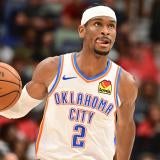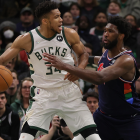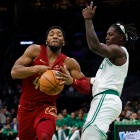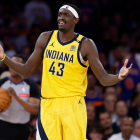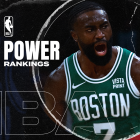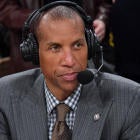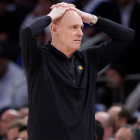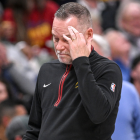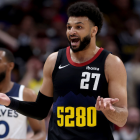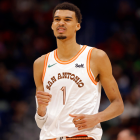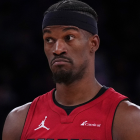
Caesars Sportsbook currently gives Milwaukee Bucks superstar Giannis Antetokounmpo a 10 percent chance to win the 2021-22 NBA MVP award. Those are the odds implied by the +900 line they've currently set for that outcome. You can quibble with the exact figure if you'd like, but broadly, it represents the general tone of this race. The past several months have largely been spent debating the merits of Joel Embiid vs. Nikola Jokic.
Embiid and Jokic -- currently the two MVP favorites (Embiid has -150 odds; Jokic is listed at +135) -- faced off head-to-head earlier in March in a game largely billed as a showdown for the award. Jokic won the award a year ago. Embiid was the 2020-21 betting favorite before a mid-season injury. When ESPN's Tim Bontemps took a straw poll of likely voters for the 2022 award in February, the two of them gobbled up 88 of the possible 100 possible first-place votes. Antetokounmpo scored just nine. Regardless of whether or not Giannis actually deserves to be in this race, there is clearly a perception circulating that he isn't. Winning bets often boils down to identifying disconnects between perception and reality, and through that lens, there's some money to be made on this race because based on merit, there is absolutely no reason Antetokounmpo should be out of the running.
Basketball-Reference.com has a model that projects win probability for each candidate based on their similarity to prior winners. That model pegs Jokic, second at most Vegas books, as the 37.9 percent favorite. The betting favorite, Embiid, has just an 11.3 percent chance according to their model. Antetokounmpo is nestled between the two at 28.1 percent, closer to Jokic than he is to Embiid. Most of the analytics-based models order the candidates the same way.
The MVP award is obviously not a purely objective exercise in number-crunching. Each voter uses their own criteria to determine their winner, but as Brandon Anderson of the Action Network laid out in October, three main factors tend to determine who actually wins the award:
- Availability. As Anderson notes, no MVP in the past 40 years has missed more than 11 games. Embiid has missed 13 and Antetokounmpo have missed 12, but voters are likely to be a bit more forgiving considering the COVID-19 pandemic. However, neither is in a position where missing more games would be advisable.
- Scoring. All three candidates cross the 25-point scoring threshold Anderson laid out as the typical barrier for recent MVPs, but Antetokounmpo and Embiid are both hovering around 30 points per game. That gives them a slight advantage over Jokic, who's a bit lower at 26. Both could position themselves for a slight boost by winning the scoring title, as four of the past eight MVPs have done so, but they'll face stiff competition from LeBron James in the process.
- Winning. This is the big one. Of the past 22 MVPs, 16 have been No. 1 seeds and four have been No. 2 seeds. Otherwise, we've seen one No. 3 seed (Jokic a season ago) and one No. 6 seed (Russell Westbrook in 2016, when he became the first player in five decades to average a triple-double). More than half of all winners have had the best record in the NBA. This tends to be the least negotiable criterion among MVP voters, and it's the one that merits further explanation.
In reality, it's not exactly fair to hold Jokic's seed against him. He's led the depleted Nuggets to a remarkable 42-30 mark—just 2.5 games behind Milwaukee and Philadelphia at 44-27—but he plays in the Western Conference. That his him fighting to avoid the play-in round. His Nuggets sit just a half-game ahead of the Minnesota Timberwolves at the moment. If they are passed, Jokic would fall to No. 7, a perch no post-merger player has ever won the MVP from. A compelling case could be made that Jokic keeping Denver that high without Jamal Murray and Michael Porter Jr. is more impressive than what either Antetokounmpo or Embiid has done, but it would be a case without a historical precedent.

CBS Sports HQ Newsletter
Your Ultimate Guide to Every Day in Sports
We bring sports news that matters to your inbox, to help you stay informed and get a winning edge.
Thanks for signing up!
Keep an eye on your inbox.
Sorry!
There was an error processing your subscription.
The seeding race between Antetokounmpo and Embiid is a bit more interesting. They have identical records in the same conference. They've split their first two head-to-head matchups and have one face-off still to come. Milwaukee has a slightly harder schedule, but the Bucks are trending in a much better direction.
Milwaukee has lost just one March game that Antetokounmpo has played in. It came on the road at Golden State. The 76ers are 5-4 in their last nine and have another obstacle to overcome: their own priorities. The 76ers are planning to rest Embiid a bit before the playoffs, and he's not objecting. "At some point, you gotta think about what's gonna take us there, and I have to be extremely fresh for the playoffs, so I would imagine I will sit a game or two to finish the year," the star center said.
The same may be true of Antetokounmpo, who sat out on Saturday with a knee injury. His Bucks just have a far better track record of surviving without him. Milwaukee is 16-17 in games he's missed over the past three seasons. That record improves if you count the postseason. The 76ers may have stunned the Heat on Monday behind inspired performances from Tyrese Maxey and Shake Milton, but they've historically struggled mightily with Embiid out. Andre Drummond helped plug the backup center hole before the James Harden trade, but with him gone, the 76ers have had to lean on decrepit veterans Paul Millsap and DeAndre Jordan. In the minutes Embiid has missed since the deadline, the 76ers are giving up a miserable 116.5 points per 100 possessions. They can't get stops without him on the floor.
All in all, the Eastern Conference seeding race projects to be very close. In fact, FiveThirtyEight projects Milwaukee, Philadelphia and Boston will all tie for No. 2 when the dust settles. While projecting tiebreakers at this stage is almost impossible, this scenario likely pushes the 76ers to No. 4 based on a divisional tiebreaker with Boston that they are likely to lose. Overall, there is not likely to be much of a difference in the standings.
The other traditional MVP markers of scoring and availability are going to wind up fairly close as well. Antetokounmpo's meaningful advantage in efficiency and most defensive metrics likely explains why most models favor him over Embiid, but generally speaking, these are two fairly similar candidates having fairly similar seasons.
That would be fine if their odds were, well, similar. But they aren't. Embiid is favored. Antetokounmpo is a nine-to-one underdog. If Embiid is favored based on the perception that voters prefer the narrative of his season, well, it's worth asking just how precarious that narrative might be.
If succeeding without Ben Simmons is what fueled Embiid's narrative, his brief tenure alongside Harden hasn't exactly helped his case. It's a small sample, but Philadelphia's net rating and winning percentage have improved only marginally since the deal. It makes little sense to select an MVP based on a single game, but if we're discussing narrative, it's worth noting that the 76ers got blown out by Harden's former Nets team in their biggest game since the trade. They lost the head-to-head battle with Jokic as well. Quality wins over Dallas and Cleveland should hold off the idea that they can't beat good teams, but it's going to be a thought that lingers in the minds of voters if they don't take care of business against the Suns and Bucks, both of whom are looming on their schedule.
None of this is likely to cost Embiid the MVP in a vacuum. It just suggests that has candidacy is a bit more vulnerable than the odds suggest. His objective merits are relatively similar to Antetokounmpo's. If this comes down to voter subjectivity, Embiid is not a slam dunk. After all, Antetokounmpo has some narrative advantages of his own. Embiid was without Simmons. Antetokounmpo didn't have Brook Lopez most of the year. That forced him to play out of position for parts of the season. Voters have no misgivings about him or his team because they just won the championship.
That doesn't make Giannis the favorite. It makes him the sensible fallback option. Voters might pivot off of Jokic if his team's seed is too low. They might sour on Embiid's narrative if Philadelphia doesn't finish the season strong, or if he misses too many more games, or if any number of other negative outcomes befall the 76ers. That's what makes Antetokounmpo such an enticing bet at +900. He doesn't have to do anything else right. He's just the easy beneficiary if anything goes wrong for everybody else. If the other candidates give Antetokounmpo an opening, he's going to take it, and if NBA history has taught us anything, it's that there's probably a better than 10 percent chance of that happening.










